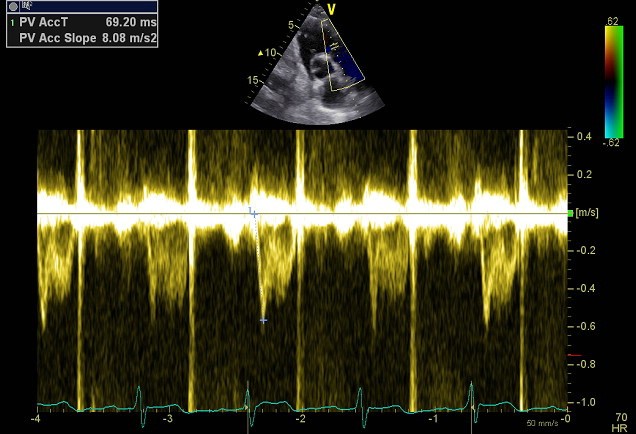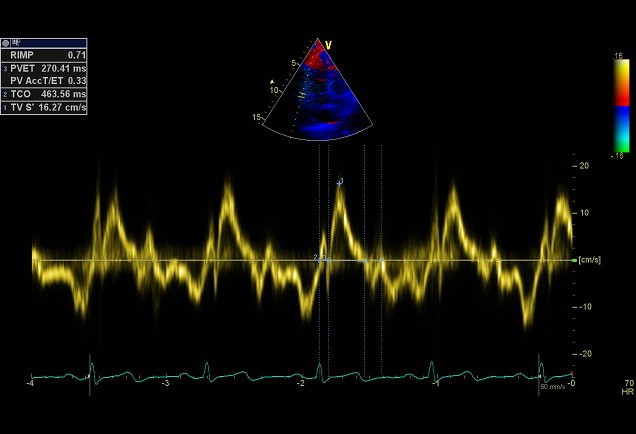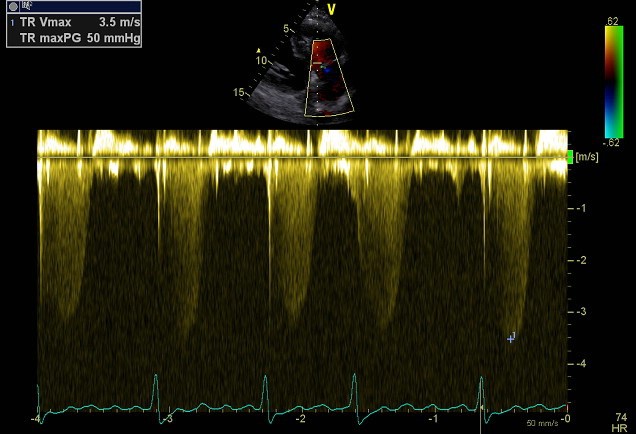Pulmonary hypertension (PHT) is a type of high blood pressure that affects he pulmonary arteries. Pulmonary arterial hypertension causes thickening and stiffening of the pulmonary artery walls, which leads to permanent damage of vessel wall. The consequence of this, is that the pressure rise in the pulmonary artery, and also in the RV. PHT is a pressure load for the right heart.
WHO classification
| Category | Subcategories |
|---|---|
| Pulmonary Artery Hypertension (PAH) | • Idiopathische PAH (onbekende oorzaak) |
| • Familiaire PAH (genetische oorzaak) | |
| • PAH door onderliggende oorzaken als; bindweefselziekten, aangeboren hartziekten, portale hypertensie, HIV-infectie, geneesmiddelen, drugs, giftige stoffen en andere factoren. | |
| •PAH met significante veneuze en/of capillaire betrokkenheid | |
| •Persisterende pulmonale hypertensie van pasgeborenen | |
| Pulmonary hypertension at left sided heartdiseases | • At left atrium and/or left ventricle disorders |
| • At valvediseases | |
| Pulmonary hypertension at lungsiseases and/or hypoxemia | • Chronic obstructive pulmonary diseases (COPD) |
| • Interstitial lungdiseases | |
| • Sleep disorders; alveolar hypoventilation; chronic exposion to great hights. | |
| • Congenital disorders /developmental | |
| Pulmonary hypertension as a result of chronic trombotic and /or embolic processes | • Trombo-embolic obstruction of proximal lungarteries |
| • Trombo-embolic obstruction of distal lungarteries | |
| • Pulmonary embolism (e.g. tumor, parasite, corpus alienum, bone marrow) | |
| Pulmonary hypertension as a result of other syndromes and disorders | • Sarcoïdosis |
| • Histiocytosis X | |
| • Lymphangioleiomyomatosis | |
| • Sickle cells | |
| • Outside compression on lungarteries (e.g. by lymphadenopathy, tumor, fibrosing mediastinitis) | |
| • Storage disease |
RV pressure cavity and functional measuremenst that may indicate PHT
| Parameter | Normal | Intermediate | Abnormal |
|---|---|---|---|
| RA Pressure (mmHg) | <5 | 5 - 10 | >10 |
| RV Syst Pressure (mmHg) | <37 | ≥37 | |
| TR Vmax (m/s) | <2.8 | 2.8 - 3.4 | >3.4 |
| AccT (ms) | >110 | 110 - 105 | <105 |
| RA volume index (ml/m²) MALE | ≤34 | >34 | |
| RA volume index (ml/m²) FEMALE | ≤27 | >27 | |
| RA FAC (%) | 32-60 | ≤32 | |
| LV eccenctricty index | 1 | >1 * ** | |
| RV MPI (Pulsed) | <0.28 | 0.28 - 0.32 | >0.32 |
| RV MPI (TDI) | <0.55 | ||
| S' TV annulus (cm/s) | >12 | 11.5 - 12 | <11.5 |
| IVRT (ms) | <75 | ≥75 | |
| TAPSE | ≥20 | 16 - 20 | <16 |
| Contour flow RVOT | Parabolic | Variable | Triangular |
* >1 at end-diastole indicates volume loading of the RV,
** >1 at end-systole indicates pressure loading of the RV


 Flow in RVOT with a short acceleration time and a systolic notch
Flow in RVOT with a short acceleration time and a systolic notch

RIMP with prolonged isovolumetric times

Increased RVSP
Calculation of pulmonary artery pressure
| Parameter | Formula |
|---|---|
| Systolic PA pressure | 4 x (TR Vmax)² + estimated RA pressure |
| Diastolic PA pressure | 4 x (PR Ved)² + estimated RA pressure |
| Mean PA pressure | 0.3 x systolische PA-druk + 0.6 x diastolic PA pressure |
| 90 - (0.62 x AccT) if Accelaration Time < 120ms | |
| 4 x (PR Vmax)² + estimated RA pressure | |
| TR PGmean + estimated RA pressure |
The information above comes from Echocardiografie.nl. Last changed on: 6 September 2023.
